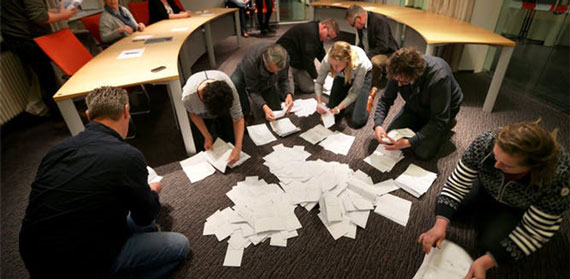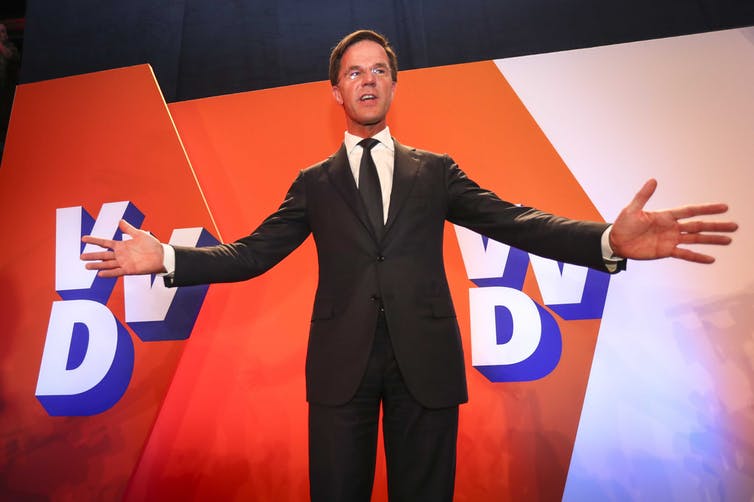Counting underway in a 2016 Dutch referendum on the EU’s deal with Ukraine. Catrinus Van Der Veen/EPA
Guest post by Professor Matt Qvortrup, Centre for Trust, Peace and Social Relations
Dutch voters will go to the polls on March 21 for a referendum on the Security Act 2017, a law which grants the authorities extended surveillance rights.
As in many other states, such legislation has raised concern in the Netherlands that the government is snooping on emails and other personal communication.
Unlike most countries, however, Dutch voters can currently do something about it thanks to a 2015 law that means the government must hold an advisory referendum if 300,000 voters call for one.
But the Dutch government now plans to overturn this right in the future. On February 22, a majority in the Tweede Kamer, the lower house of the Dutch parliament, voted to scrap the referendum law. It’s unlikely that the vote will be undone by the Senate when it comes to vote on the issue.
The March plebiscite on surveillance powers, which is happening at the same time as local council elections, might well be the country’s last advisory referendum.
Embarrassing results
The Advisory Referendum Law was the brainchild of three MPs from the social liberal party, Democraten 66 (D66) – a party founded in the free-spirited and idealistic 1960s – the Socialists and the Green Party. The law was supported by these parties and rightist populist Geert Wilders’ Freedom Party (PVV). It was opposed by the centre-right People’s Party for Freedom and Democracy (VVD) – the party of current prime minister Mark Rutte – and the two small Christian Democrat parties, the CDA and ChristenUnie.
Its aim was to hold politicians to account. While the result is non-binding, it is only quorate if more than 30% of voters turn out – in which case it’s difficult for Dutch politicians to ignore the result.
A new Dutch coalition government comprised of the VVD, CDA and ChristenUnie and the D66, took office in 2017. Rutte is a critic of referendums, and the move to abolish the right to demand referendums happened at his instigation. But it’s remarkable, given the D66’s role in passing the law in the first place.
Dutch prime minister Mark Rutte on election night in March 2017. Jerry Lampen/EPA
The reason for the turnaround is that Dutch voters have not behaved as expected. Politicians didn’t expect voters to actually challenge controversial legislation – but that’s exactly what happened, most notably in a 2016 referendum called to block the European Union’s Association Treaty with Ukraine.
As treaties with foreign countries must be unanimously approved by the EU states, the Dutch parliament could block the treaty. A concerted effort, sponsored by the Hungarian-American billionaire George Soros, and spearheaded by Rutte, campaigned for ratification. Despite this, in April 2016, 61% of the Dutch electors voted to block the European Union’s Association Treaty with the Ukraine on a 32% turnout.
The outcome did not cause a revolution, nor did it fundamentally alter the relationship between the EU and the Ukraine. But it forced the Dutch government – and the EU as a whole – to find a compromise position, and to justify this to their voters.
Not how to strengthen democracy
“The referendum”, as Albert Dicey, a prominent legal theorist, once observed, is “the people’s veto”. And in many ways, the Dutch referendum in 2016 was a clear example of this in practice.
But politicians do not like to be embarrassed. Now, rather than having to explain themselves to the voters, Dutch politicians want to abolish the right to demand referendums.
Apart from Ireland in 1928, no democratic country has taken away the right to demand referendums. Back then, the opposition party, Fianna Fail, had collected signatures to overturn the requirement that members of the Dáil swear allegiance to the British Monarch. The then Irish prime minister, William Thomas Cosgrave, responded not by holding a referendum, but by abolishing the provision before a plebiscite could take place.
The Dutch government’s argument seems to be that referendums “undermine democracy”. But this is – to use a British expression – “double Dutch”: gibberish or gobbledygook.
Democracies are not strengthened by doing away with referendums. If you take away responsibility from people they become irresponsible; but if you give responsibility to people they become responsible. That’s why, in 2012, voters in California voted for tax increases. They were aware that the public sector required more money to deliver the level of services required in the state.
The referendum also provides a safety valve for letting out political steam. Those unhappy with specific policies can use the referendum to demand specific changes. In the absence of advisory referendums in the future, disgruntled Dutch voters might resort to protest voting and they could turn to protest parties to show dissatisfaction. This could strengthen Wilders’ far right PVV party.
Elsewhere in the world, referendums are on the increase. In some cases, the referendum has been used to resolve internal political conflicts. David Cameron’s ill-fated Brexit referendum was held to keep his party together. But in most cases, the referendums are held either because they are demanded by the people – as in Switzerland, half of the US states and Italy – or because the constitution requires that fundamental issues are supported by the mass of the electorate, which is the case in Australia, Ireland and Denmark. And in most cases, the ruling government has lost when it has tried to steamroll fundamental changes.
There’s no reason to change this law. Referendums – as a general rule – have been a people’s shield, not the governors’ sword. Sadly, this shield will be taken away from the Dutch voters.
Originally written for ‘the Conversation’.





Comments are disabled